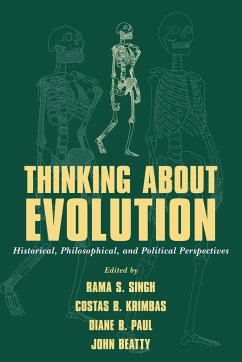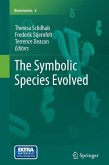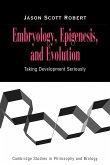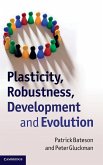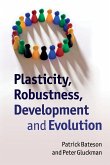Thinking about Evolution
Historical, Philosophical, and Political Perspectives
Herausgeber: Singh, Rama S.; Paul, Diane B.; Krimbas, Costas B.
Thinking about Evolution
Historical, Philosophical, and Political Perspectives
Herausgeber: Singh, Rama S.; Paul, Diane B.; Krimbas, Costas B.
- Broschiertes Buch
- Merkliste
- Auf die Merkliste
- Bewerten Bewerten
- Teilen
- Produkt teilen
- Produkterinnerung
- Produkterinnerung
This 2001 text is the second of two volumes published by Cambridge University Press in honour of Richard Lewontin.
Andere Kunden interessierten sich auch für
![The Symbolic Species Evolved The Symbolic Species Evolved]() The Symbolic Species Evolved166,99 €
The Symbolic Species Evolved166,99 €![Issues in Psychotherapy Research Issues in Psychotherapy Research]() Michel Hersen / Alan S. Bellack (eds.)Issues in Psychotherapy Research125,99 €
Michel Hersen / Alan S. Bellack (eds.)Issues in Psychotherapy Research125,99 €![Issues in Psychotherapy Research Issues in Psychotherapy Research]() Issues in Psychotherapy Research125,99 €
Issues in Psychotherapy Research125,99 €![Embryology, Epigenesis and Evolution Embryology, Epigenesis and Evolution]() Jason Scott RobertEmbryology, Epigenesis and Evolution117,99 €
Jason Scott RobertEmbryology, Epigenesis and Evolution117,99 €![Embryology, Epigenesis and Evolution Embryology, Epigenesis and Evolution]() Jason Scott RobertEmbryology, Epigenesis and Evolution51,99 €
Jason Scott RobertEmbryology, Epigenesis and Evolution51,99 €![Plasticity, Robustness, Development and Evolution Plasticity, Robustness, Development and Evolution]() Patrick BatesonPlasticity, Robustness, Development and Evolution120,99 €
Patrick BatesonPlasticity, Robustness, Development and Evolution120,99 €![Plasticity, Robustness, Development and Evolution Plasticity, Robustness, Development and Evolution]() Patrick BatesonPlasticity, Robustness, Development and Evolution61,99 €
Patrick BatesonPlasticity, Robustness, Development and Evolution61,99 €-
-
-
This 2001 text is the second of two volumes published by Cambridge University Press in honour of Richard Lewontin.
Hinweis: Dieser Artikel kann nur an eine deutsche Lieferadresse ausgeliefert werden.
Hinweis: Dieser Artikel kann nur an eine deutsche Lieferadresse ausgeliefert werden.
Produktdetails
- Produktdetails
- Verlag: Cambridge University Press
- Seitenzahl: 626
- Erscheinungstermin: 11. Januar 2011
- Englisch
- Abmessung: 234mm x 156mm x 33mm
- Gewicht: 936g
- ISBN-13: 9780521178310
- ISBN-10: 0521178312
- Artikelnr.: 30976575
- Herstellerkennzeichnung
- Produktsicherheitsverantwortliche/r
- Europaallee 1
- 36244 Bad Hersfeld
- gpsr@libri.de
- Verlag: Cambridge University Press
- Seitenzahl: 626
- Erscheinungstermin: 11. Januar 2011
- Englisch
- Abmessung: 234mm x 156mm x 33mm
- Gewicht: 936g
- ISBN-13: 9780521178310
- ISBN-10: 0521178312
- Artikelnr.: 30976575
- Herstellerkennzeichnung
- Produktsicherheitsverantwortliche/r
- Europaallee 1
- 36244 Bad Hersfeld
- gpsr@libri.de
Preface; Introduction; 1. Does culture evolve? Richard Lewontin; Part A.
History of and in Evolutionary Biology: 2. The nature of evolutionary
biology: an interchange among Richard Lewontin, Diane Paul, John Beatty and
Costas Krimbas; 3. Hannah Arendt and Karl Popper: Darwinism, Fatalism and
Totalitarianism John Beatty; 4. The genetics of experimental populations:
L'Heritier and Teisser's population cages Jean Gayon and Michel Veuille; 5.
Did eugenics rest on an elementary mistake? Diane Paul and Hamish Spencer;
6. Can the norm of reaction save the gene concept? Rafi Falk; 7. The
apportionment of human diversity twenty-five years later Maryellen Ruvolo
and Mark Seielstad; 8. The Indian caste system: origin, evolution and
impact on human diversity Rama Singh; Part B. Philosophy of Evolutionary
Biology: 9. Selfish genes or developmental systems? Russel Gray; 10. The
evolutionary definition of selective agency, the validation of the theory
of hierarchical selection, and the fallacy of the selfish gene Stephen J.
Gould; 11. Reductionism in genetics and the human genome project Sahotra
Sarkar; 12. Organism and environment Peter Godfrey-Smith; 13. Levels and
units of selection Lisa Lloyd; 14. In defense of neo-Darwinism: Popper's
'Darwinism as a metaphysical programme' revisited Costas Krimbas; 15. The
two faces of fitness Elliot Sober; 16. Evolvability: adaptation and
modularity Jeffrey C. Schank and Bill Wimsatt; 17. Organism and environment
revisited Robert Brandon; 18. An 'irreducible' component of cognition
Massimo Piattelli-Palmarini; Part C. The Politics of Evolutionary Biology:
19. What causes cancer? A political history of recent debates Robert
Proctor; 20. Battling the undead: how (and how not) to resist genetic
determinism Philip Kitcher; 21. The rise of neurogenetic determinism Steven
Rose; 22. Behavior genetics: Galen's prophecy or Malpighi's legacy? Evan
Balaban; 23. Identity politics and biology Ruth Hubbard; 24. The
agroecosystem: the modern vision in crisis, the alternative evolving John
Vandermeer; 25. Political economy of agricultural genetics Jean-Pierre
Berlan; 26. The butterfly ex machina Richard Levins; 27. Evoking
transmutational dread: military and civilian uses of nuclear and genetic
alchemies Robert Haynes; 28. From natural selection to natural construction
to disciplining unruly complexity: the challenge of integrating ecological
dynamics into evolutionary theory Peter Taylor.
History of and in Evolutionary Biology: 2. The nature of evolutionary
biology: an interchange among Richard Lewontin, Diane Paul, John Beatty and
Costas Krimbas; 3. Hannah Arendt and Karl Popper: Darwinism, Fatalism and
Totalitarianism John Beatty; 4. The genetics of experimental populations:
L'Heritier and Teisser's population cages Jean Gayon and Michel Veuille; 5.
Did eugenics rest on an elementary mistake? Diane Paul and Hamish Spencer;
6. Can the norm of reaction save the gene concept? Rafi Falk; 7. The
apportionment of human diversity twenty-five years later Maryellen Ruvolo
and Mark Seielstad; 8. The Indian caste system: origin, evolution and
impact on human diversity Rama Singh; Part B. Philosophy of Evolutionary
Biology: 9. Selfish genes or developmental systems? Russel Gray; 10. The
evolutionary definition of selective agency, the validation of the theory
of hierarchical selection, and the fallacy of the selfish gene Stephen J.
Gould; 11. Reductionism in genetics and the human genome project Sahotra
Sarkar; 12. Organism and environment Peter Godfrey-Smith; 13. Levels and
units of selection Lisa Lloyd; 14. In defense of neo-Darwinism: Popper's
'Darwinism as a metaphysical programme' revisited Costas Krimbas; 15. The
two faces of fitness Elliot Sober; 16. Evolvability: adaptation and
modularity Jeffrey C. Schank and Bill Wimsatt; 17. Organism and environment
revisited Robert Brandon; 18. An 'irreducible' component of cognition
Massimo Piattelli-Palmarini; Part C. The Politics of Evolutionary Biology:
19. What causes cancer? A political history of recent debates Robert
Proctor; 20. Battling the undead: how (and how not) to resist genetic
determinism Philip Kitcher; 21. The rise of neurogenetic determinism Steven
Rose; 22. Behavior genetics: Galen's prophecy or Malpighi's legacy? Evan
Balaban; 23. Identity politics and biology Ruth Hubbard; 24. The
agroecosystem: the modern vision in crisis, the alternative evolving John
Vandermeer; 25. Political economy of agricultural genetics Jean-Pierre
Berlan; 26. The butterfly ex machina Richard Levins; 27. Evoking
transmutational dread: military and civilian uses of nuclear and genetic
alchemies Robert Haynes; 28. From natural selection to natural construction
to disciplining unruly complexity: the challenge of integrating ecological
dynamics into evolutionary theory Peter Taylor.
Preface; Introduction; 1. Does culture evolve? Richard Lewontin; Part A.
History of and in Evolutionary Biology: 2. The nature of evolutionary
biology: an interchange among Richard Lewontin, Diane Paul, John Beatty and
Costas Krimbas; 3. Hannah Arendt and Karl Popper: Darwinism, Fatalism and
Totalitarianism John Beatty; 4. The genetics of experimental populations:
L'Heritier and Teisser's population cages Jean Gayon and Michel Veuille; 5.
Did eugenics rest on an elementary mistake? Diane Paul and Hamish Spencer;
6. Can the norm of reaction save the gene concept? Rafi Falk; 7. The
apportionment of human diversity twenty-five years later Maryellen Ruvolo
and Mark Seielstad; 8. The Indian caste system: origin, evolution and
impact on human diversity Rama Singh; Part B. Philosophy of Evolutionary
Biology: 9. Selfish genes or developmental systems? Russel Gray; 10. The
evolutionary definition of selective agency, the validation of the theory
of hierarchical selection, and the fallacy of the selfish gene Stephen J.
Gould; 11. Reductionism in genetics and the human genome project Sahotra
Sarkar; 12. Organism and environment Peter Godfrey-Smith; 13. Levels and
units of selection Lisa Lloyd; 14. In defense of neo-Darwinism: Popper's
'Darwinism as a metaphysical programme' revisited Costas Krimbas; 15. The
two faces of fitness Elliot Sober; 16. Evolvability: adaptation and
modularity Jeffrey C. Schank and Bill Wimsatt; 17. Organism and environment
revisited Robert Brandon; 18. An 'irreducible' component of cognition
Massimo Piattelli-Palmarini; Part C. The Politics of Evolutionary Biology:
19. What causes cancer? A political history of recent debates Robert
Proctor; 20. Battling the undead: how (and how not) to resist genetic
determinism Philip Kitcher; 21. The rise of neurogenetic determinism Steven
Rose; 22. Behavior genetics: Galen's prophecy or Malpighi's legacy? Evan
Balaban; 23. Identity politics and biology Ruth Hubbard; 24. The
agroecosystem: the modern vision in crisis, the alternative evolving John
Vandermeer; 25. Political economy of agricultural genetics Jean-Pierre
Berlan; 26. The butterfly ex machina Richard Levins; 27. Evoking
transmutational dread: military and civilian uses of nuclear and genetic
alchemies Robert Haynes; 28. From natural selection to natural construction
to disciplining unruly complexity: the challenge of integrating ecological
dynamics into evolutionary theory Peter Taylor.
History of and in Evolutionary Biology: 2. The nature of evolutionary
biology: an interchange among Richard Lewontin, Diane Paul, John Beatty and
Costas Krimbas; 3. Hannah Arendt and Karl Popper: Darwinism, Fatalism and
Totalitarianism John Beatty; 4. The genetics of experimental populations:
L'Heritier and Teisser's population cages Jean Gayon and Michel Veuille; 5.
Did eugenics rest on an elementary mistake? Diane Paul and Hamish Spencer;
6. Can the norm of reaction save the gene concept? Rafi Falk; 7. The
apportionment of human diversity twenty-five years later Maryellen Ruvolo
and Mark Seielstad; 8. The Indian caste system: origin, evolution and
impact on human diversity Rama Singh; Part B. Philosophy of Evolutionary
Biology: 9. Selfish genes or developmental systems? Russel Gray; 10. The
evolutionary definition of selective agency, the validation of the theory
of hierarchical selection, and the fallacy of the selfish gene Stephen J.
Gould; 11. Reductionism in genetics and the human genome project Sahotra
Sarkar; 12. Organism and environment Peter Godfrey-Smith; 13. Levels and
units of selection Lisa Lloyd; 14. In defense of neo-Darwinism: Popper's
'Darwinism as a metaphysical programme' revisited Costas Krimbas; 15. The
two faces of fitness Elliot Sober; 16. Evolvability: adaptation and
modularity Jeffrey C. Schank and Bill Wimsatt; 17. Organism and environment
revisited Robert Brandon; 18. An 'irreducible' component of cognition
Massimo Piattelli-Palmarini; Part C. The Politics of Evolutionary Biology:
19. What causes cancer? A political history of recent debates Robert
Proctor; 20. Battling the undead: how (and how not) to resist genetic
determinism Philip Kitcher; 21. The rise of neurogenetic determinism Steven
Rose; 22. Behavior genetics: Galen's prophecy or Malpighi's legacy? Evan
Balaban; 23. Identity politics and biology Ruth Hubbard; 24. The
agroecosystem: the modern vision in crisis, the alternative evolving John
Vandermeer; 25. Political economy of agricultural genetics Jean-Pierre
Berlan; 26. The butterfly ex machina Richard Levins; 27. Evoking
transmutational dread: military and civilian uses of nuclear and genetic
alchemies Robert Haynes; 28. From natural selection to natural construction
to disciplining unruly complexity: the challenge of integrating ecological
dynamics into evolutionary theory Peter Taylor.

